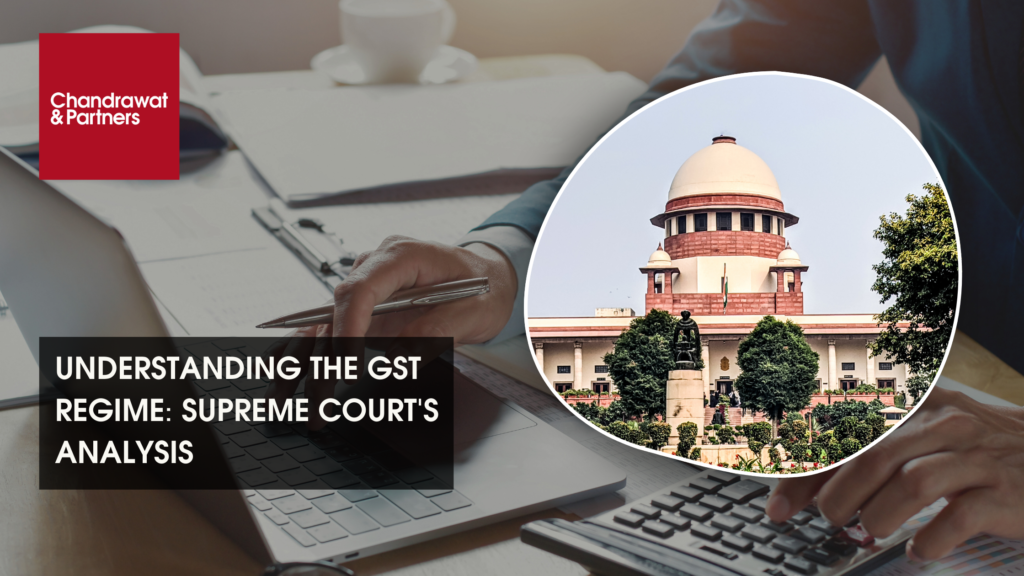Home > Recent Judgements > Understanding The GST Regime: Supreme Court’s Analysis
Jan 06, 2025
INTRODUCTION
The Supreme Court of India delivered a significant judgment in the case of Muskan Enterprises & Anr. versus The State of Punjab & Anr, addressing crucial questions regarding the interpretation and implementation of Good and Service Tax (“GST”) notifications. The dispute originated when Appellant challenged notifications issued under Section 9(1) of the Central Goods and Services Tax Act, 2017, raising fundamental questions about the constitutional validity and scope of such notifications. At its core, the case examined the intricate relationship between Article 279A of the Constitution, which establishes the GST Council, and the legislative powers of Parliament and state legislatures. The case centered around the validity of notifications issued under Section 9(1) of the Central Goods and Services Tax Act, 20 17 (“CGST”) and the corresponding state GST laws.
Section 9(1) deals with “Levy and Collection of Tax” under CGST Act, 2017 and states: Subject to the provisions of sub-section (2), there shall be levied a tax called the central goods and services tax on all intra-State supplies of goods or services or both, except on the supply of alcoholic liquor for human consumption.
KEY ISSUES
- Whether GST notifications can have retrospective effect?
- Whether notifications issued under Section 9(1) of CGST Act were within constitutional bounds?
JUDGMENT
The Court went very closely into the nature of GST in the constitutional parlance of the country referring principally to Article 279A of the Constitution of India and its impact on the recommendations made by the GST Council of India. The Court for this said that the recommendations of the GST Council are persuasive but not binding on the state legislatures or the Parliament.
Notifications under Section 9(1) of the CGST Act was the area of focus of the Court. That way it explained that these notifications need to be read in conjunction with the parent statute and cannot go beyond the enabling provision.
A crucial aspect of the judgment dealt with the retrospective application of GST notifications. The Court held that notifications cannot be applied retrospectively unless explicitly provided for in the statute and supported by clear legislative intent.
OBSERVATION
The Court made important observations about the operation of the GST Council, and note that even though the Council provides recommendations, such recommendations are not binding. This observation also strengthens the federal structure in taxing system of India.
The Court stipulated on the great significance of the legislative purpose bearing in mind the task of the interpretation of the tax statutes and notifications. This it noted that any uncertainty in the tax legislation should be resolved in a manner that is pro- taxpayer, considering the well accepted principle of strict legal interpretation of tax statutes.
One of the features of interest was related to the preservation of the federal balance in determining the conditions of the implementation of the GST. The Court hence pointed out that while exercising their functions in the discharge of their respective responsibilities each of the Centre and the States would need to undertake cooperation whilst recognizing the jurisdictional divide set out in the Constitution.
The judgment supports the rights of taxpayers where the changes in the tax liability labelling must be clear, indicate change unambiguously and must be notified to the taxpayers in compliance with principles of natural justice.
The Muskan Enterprises case judgment is one of the landmark judgments of the Indian Tax law system more so with regards to GST Act. It incorporates the principles of efficient and effective taxation for revenue collection together with the protection of taxpayers’ rights and conforms to India’s federal system of Government. The principles formulated in this judgment will act as crucial legal milestones for the tax administration as well as for the parties intending to challenge a GST provision.
This judgment re-emphasises on the message aspect of taxes and the need for co-operative federalism in Indian GST framework. It will undoubtedly have implications with respect to subsequent legislative and administrative developments about indirect taxation.
For more information or queries, please email us at
[email protected]





